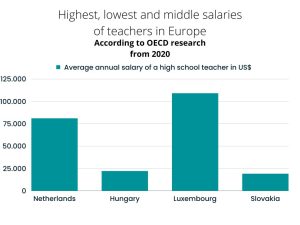Berta Béata is a Hungarian teacher, who teaches English and Hungarian to fourth graders at the Karinthy Frigyes Gimnázium in Budapest. At least, she used to. For the last couple of weeks, she has been participating in ‘civil disobedience’, and she is not the only one. Hundreds of teachers are striking, because they demand better working conditions.
This rises a lot of questions. What is ‘civil disobedience’? If the working conditions are that bad, what are they exactly? If this has been going on for weeks, why isn’t anything being done about it?
This article will take a deeper dive in to all of these questions and more.
How much does a Hungarian teacher make?
You can’t be blamed for not knowing the current salary of a teacher in Hungary. That’s why we start this article with an closer look into how much money teachers actually make in Hungary.
According to news outlet Hungary Today teachers in Hungary only earn about 66% of the average national income. If we put these stats into numbers we can conclude that the average salary of a teacher in Hungary is approximately 240.000 HFU (Hungarian Forints), which calculates to about 640 euros per month. The strange thing is, that these salaries differ from person to person.
For example: Maria Nemes, who has been teaching at the Karinthy Frigyes high school in Budapest for over 20 years now, makes only 600 euros per month, while other teachers earn up to 750 euros. Elementary school teachers have it even worse, they average a monthly salary of only 460 euros.

To put this all in perspective: the wages of Hungarian teachers are the lowest of any member state of the OECD (Organisation for Economic Co-operation and Development).
The reason for these low wages can be found in a 2015 law. This law anchored the minimum wage of teachers. Whilst other sectors followed the national minimum wage (which goes up according to the inflation index), the teachers are still on the same minimum wage level as they were in 2015. So when over the course of 8years other sectors saw their minimum wage double, the teachers could only watch in envy while their salaries stayed the same.
So, now that you are up-to-date on the salary situation of the teachers, you can already feel where their anger is coming from.
Start of a (r)evolution?
Let’s start digging in the events that led to the moment where people like Bea felt like their only option was ‘civil disobedience’.
It all started about a year ago, on the 31st of January. The unions had been negotiating with the government for months for better working salaries, but without success. So the teachers decided to take matters in to their own hands. A two-hour ‘warning strike’ was held, in which a lot of teachers from all over the country joined. The warning being: if you don’t act on our claims, more strikes will follow.
And as you can guess: more strikes followed. A strike of indefinite length was announced to start on March 16th, but the government was much more quick to serve the protestors with a reply. A special decree was announced on February 11th, which limited the right to strike for teacher.
“ In the event of a strike, students must be supervised by qualified teachers between 7 a.m. and 4 p.m. on all working days affected by the strike. In addition, schools affected by the strike are obliged to hold 50% of their lessons, and students who are about to graduate cannot miss any lessons.”
So in fact a lot of teachers are still working, even while they’re on strike. The reasoning given for this decree was the COVID-19 pandemic, which makes no sense at all.
From this moment on, striking became much more difficult for the teachers and they had to resort to protests and demonstrations during weekends and off-days.
Civil disobedience
When the new schoolyear began in September, and the situation was still as bad as the last couple of years, a lot of teachers finally said: “no more!”. The movement of ‘civil disobedience’ was born. Just stopping with working.
Ms. Béata explains it well here: “ Some days we still work, because we still want to help our students of course. But the days we participate in the civil disobedience, we come to the school in the morning and sign a list that says we are participating. Then we hold meetings about possible things we could do to help our situation.” As of now, 497 teachers from 53 different schools from all over Hungary have laid down their for an indefinite period. And with them over a thousand teachers have joined in protesting and marching the on the streets in Budapest on regular occasions.
After a few weeks of these kinds of actions the government stepped in once again. First, on the 30th of September five teachers from Kölcsey Gimnázium were fired.
On the 30th of November, the Interior Minister Sándor Pintér issued a press release, where he stated that a total of eight teachers had been fired. The cause given for the firing was ‘civil disobedience’. Two of them came from different schools: the Eötvös József Gimnázium and the Vörösmarty Mihály Gimnázium.
The other six came from the Karinthy Frigyes Gimnázium, the same school where Béata works. “ This came as a total surprise to all of us. “, she says, “ I got a lot of calls that day from friends and family, because I am one of the teachers with the most days spent in civil disobedience. They all asked me whether I was one of the teachers that just got fired, because supposedly there it included 6 people from our school. But I had no idea, the headmaster also did not know. They day after we learned which 6 teachers it were… The crazy thing is the randomness. I could be next, or I could just keep my job despite all of this. At this point, I don’t even care anymore whether they fire me or not, as long as something changes with the system and the salaries. The situation is so laughably sad that we even make jokes about it now: we say about putting bets on the next person to get fired, that way we can maybe make some money either way. I also feel sad for my daughter, because every day when I get home she asks me:
“ DID YOU GET FIRED TODAY MOM? “ “
Teachers are still going, but are losing hope piece by piece, because after a year, still nothing has changed. “We can protest as long as we want, but apart from the firings, the government is ignoring us completely” says Béata. “ The national television news channel MTV (Magyar Televízío) did not even mention when there was a demonstration of over 70.000 people in Budapest about this situation in the beginning of December. “ That is a really big issue, as MTV is still the leading news source for a lot of people, especially elderly people outside of bigger metropolitan areas.
Nothing has changed yet
The big question is ‘why?’ Why is nothing being done to help the teachers. Everybody can agree that 600 euros a month is ridiculously low. Why is the government so reluctant to help these people?
Two factors come into play here: firstly there is just no money to pay the teachers. Next to that there is also the fact that the Orbán-regime just does not really care about education.
Let’s get a bit deeper in the first factor. For some time now, Hungary has been under investigation by the European Union for breaches on the Rule of Law regulations set by the EU. As a result of this investigation, the funds from the COVID-19 Recovery Plan that were reserved for Hungary.
Orbán said that the teachers’ salary would be raised to 80% of the national average income (a good start) by 2025. This raise would be paid with the Covid recovery funds. But since they are not receiving those, no pay raise. In this way, Orbán can shove the blame for the bad situation to the European Union instead of taking it himself.
The other factor seems to be the bigger one. According to the Hungarian branch of Amnesty International, the problem is not just with the salary of the teachers. The whole education system is flawed. Education is not valued as much as in many other countries. The government sees education as a mandatory evil. It’s like they’re saying: “It has to be done, but it doesn’t have to be good, just the bare minimum will suffice. “ According to Orbán, the education system is not Hungarian enough and is too liberal and Western.
“ They don’t invest in education because they don’t want the people getting too smart. An authoritarian system does not fare well when there are a lot of highly educated people. “
– Amnesty International Hungary
Basically what they’re saying is that the government wants to keep the people as dumb as possible, in order that they won’t start questioning the government’s actions any more the then they are already doing.
It seems that it is more important to keep the elite happy. Last year the health care industry also demanded a higher pay. They got it, or should I say some of them got it. The salary of nurses stayed the same. The salary of other hospital personnel stayed the same. The salary of doctors went up. The people who were already making more money, got even more and the nurses, who really need the extra money get nothing but disappointment. There was one condition to the doctors’ pay raise: keep quiet about the whole situation from now on. There you can see how wrong the system actually is.
In conclusion: aside of the EU-investigation into breaches of the Rule of Law principle in Hungary, it is clear that other issues issues in the country also provoke thought and worry . Due to the lack of care for the education system, the next generation just keeps repeating the same mistakes made by the previous ones. On top of that the government controlled television broadcaster censors important information because it is criticizing the government. A lot of people are working towards a general improvement of the current systems that keep Hungary in their grasp. But there is still a long way to go if fundamental changes want to be implemented.




